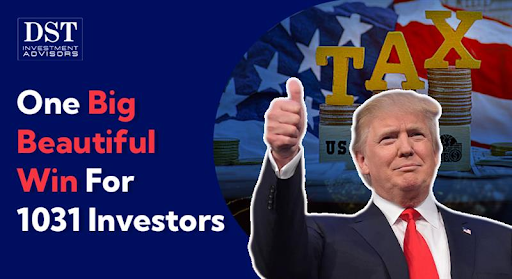How the “One Big Beautiful Bill Act” (H.R. 1) Impacts 1031 Exchanges : What Investors Need to Know

On July 1, 2025, the much-anticipated H.R. 1, officially known as the “One Big Beautiful Bill Act,” was signed into law, ushering in sweeping changes across the real estate and mortgage industries. While the headlines have focused on mortgage deductions and energy incentives, real estate investors are breathing a sigh of relief for one key reason: The 1031 Exchange survived; it was extended with strong support.
Let’s break down what this means and how you can capitalize on the updated 1031 exchange provisions moving forward.
What is a 1031 Exchange?
A 1031 exchange, under Section 1031 of the IRS tax code, allows investors to defer capital gains taxes by reinvesting proceeds from the sale of investment property into another like-kind property. It’s been one of the most powerful tools for wealth-building in real estate for over 100 years.
What H.R. 1 Did (and Didn’t) Change for 1031 Exchanges
Despite early concerns that the bill might cap or eliminate the program, as proposed in prior tax reform discussions, H.R. 1 not only preserved the 1031 exchange but confirmed its ongoing relevance for investors. Here are the key takeaways:
1. 1031 Exchange Rules Remain Intact
There are no caps, restrictions, or phase-outs. Investors can still:
- Defer 100% of capital gains taxes
- Exchange into multiple replacement properties
- Use Delaware Statutory Trusts (DSTs) for fractional interest investments
- Repeat the process indefinitely to build tax-efficient portfolios
2. QBI Deductions for Real Estate Stay in Place
The Qualified Business Income (QBI) deduction was extended, enhancing the tax benefits for real estate professionals and investors who qualify under pass-through business rules. When combined with a 1031 exchange, this creates powerful double-layer tax advantages.
3. Investor-Friendly Tone Across the Board
With the permanent extension of programs like Opportunity Zones and Low-Income Housing Tax Credits (LIHTC), H.R. 1 signals a clear endorsement of real estate investment as a vehicle for growth, revitalization, and economic impact.
What Does This Mean for You as an Investor?
If you’ve been hesitant to sell appreciated property out of fear of a tax hit, this legislation may be your green light. Now is the time to:
- Re-evaluate appreciated assets for potential 1031 exchanges
- Explore DSTs for passive replacement options with no landlord headaches
- Work with a qualified intermediary to prepare for smooth and compliant exchanges
- Optimize your portfolio with both tax deferral and cash flow in mind
Real Example: Using 1031 + DST in Today’s Market
Suppose you sell a rental property with $450,000 in gains. Rather than paying ~$100,000 in taxes, you exchange into:
- A Delaware Statutory Trust offering monthly passive income
- Or multiple like-kind properties with higher returns and lower maintenance
You keep your full equity working tax-deferred, and you can still sell or exchange again in the future.
Important Note for High-Tax States
Thanks to another H.R. 1 provision: the SALT deduction cap increase to $40,000 for those earning under $500K, investors in California, New York, and New Jersey may find new relief on their tax bills. Combined with a 1031 exchange, this could provide unprecedented tax efficiency in 2025 and beyond.
The Bigger Picture: Real Estate Is Still the Tax-Efficient King
While H.R. 1 scaled back green retrofit programs, it doubled down on real estate investment as a core strategy for economic development. Whether you’re a seasoned syndicator or a first-time investor, this is your signal: The 1031 exchange remains one of the most powerful tax tools available.
Final Thoughts: Don’t Miss the Window of Opportunity
Congress has spoken: 1031 exchanges are here to stay, for now. But as political winds shift, there’s no guarantee it stays untouched forever. If you’re sitting on appreciated assets, now is the perfect time to:
- Run a tax impact analysis
- Explore DST or TIC options
- Connect with a 1031 expert to build your exchange strategy
Need Help Navigating a 1031 Exchange?
Schedule a free consultation with our team of tax strategists and real estate advisors at DST Investment Advisors. Let’s help you preserve your gains, grow your portfolio, and invest tax-smart.
